On May 22, continuing the 9th session, National Assembly (NA) deputies discussed in groups the Draft Resolution of the NA on tuition exemption and tuition support for preschool children, general education students, and students of general education programs in the national education system.
Not only educational
According to the Government 's proposal, preschool children, high school students, and students studying general education programs at public educational institutions will be exempted from tuition fees. At the same time, tuition support will be provided for preschool children, high school students, and students studying general education programs at private educational institutions. The level of tuition support will be decided by the Provincial People's Council. The Government proposes to apply this policy from the 2025-2026 school year.
Discussing at the HCM City National Assembly delegation, delegate Nguyen Thien Nhan emphasized that the tuition fee exemption and support policy is highly anticipated by the people and expressed his joy. According to him, tuition fee exemption not only reduces the financial burden for many families but also demonstrates the humanity and concern of the Party and State for future generations in the context of many difficulties.
Mr. Nguyen Thien Nhan said that exempting tuition fees will reduce the financial burden, thereby encouraging families to have two children, contributing to ensuring a labor force for Vietnam until 2045. With this policy, Vietnam is the only country in ASEAN to exempt tuition fees from preschool to high school, demonstrating a strong investment in the country's future.
Sharing the same view, delegate Nguyen Thi Lan ( Hanoi ) assessed that this policy not only has educational significance but also indirectly supports the implementation of the national population strategy. In the context that Vietnam is facing a low birth rate in many large cities and entering the aging population stage, exempting and supporting tuition fees will help families feel secure in giving birth and raising children. Thereby, contributing to the goal of maintaining the replacement birth rate, ensuring a reasonable population structure, and sustainable development of the country.
Ms. Nguyen Thi Lan commented: "This is a policy that demonstrates the humanity and superiority of our regime; ensures consistency in the policy of equitable access to education. This policy also encourages the development of non-public education and enhances the socialization of education."
However, delegate Nguyen Thi Lan also expressed concern that exempting tuition fees at public schools could cause a sharp increase in the number of students transferring from private schools, leading to the risk of overloading the public school system. Therefore, she proposed adding regulations or assigning the Government to develop a synchronous investment plan for facilities and teacher staffing to ensure truly consistent training quality.
According to Ms. Nguyen Thi Lan, it is necessary to carefully assess the ability to balance the budget of localities, especially provinces that have not yet balanced their budgets. The government needs to calculate compensation to ensure budget sources for these localities, avoiding the case of good policies but insufficient resources for implementation, leading to delayed or uneven implementation.
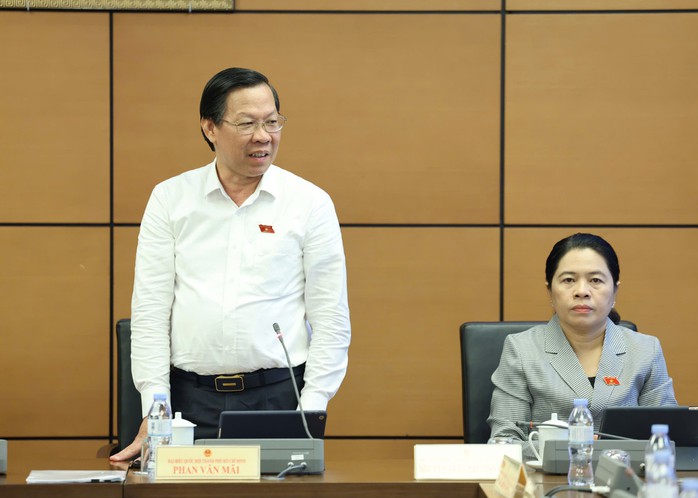
Chairman of the National Assembly's Economic and Financial Committee Phan Van Mai emphasized that investment in education is the most important investment. Photo: Pham Thang
Access to equitable and inclusive education
Mr. Bui Hoai Son, full-time delegate of the National Assembly's Committee on Culture and Society, said that the tuition exemption and support policy is a big step forward in the journey to ensure fair and comprehensive access to education for all people. This policy is highly inclusive, expands the beneficiaries, removes financial barriers for learners, and ensures fairness between public and private schools, between urban and rural areas.
"With no tuition fees, high school students will have more equal access to knowledge, reducing the rate of dropping out of school due to economic circumstances, especially in large cities - where income stratification often occurs deeply" - Mr. Bui Hoai Son expressed his opinion.
Along with the tuition exemption policy, delegate Bui Hoai Son proposed that the National Assembly and the Government need to have a mechanism to ensure the quality of education. Not only exempting and supporting tuition fees, people also expect better schools, teachers to be confident in teaching and the curriculum content to be suitable for students' abilities. In addition, it is necessary to review the budget allocation by region, avoiding the situation of equalization, causing excessive pressure on provincial and communal budgets.
Delegate Nguyen Thi Viet Nga (Hai Duong) was concerned about the issue of fairness between public and non-public school students, and between educational models in the national education system. According to the proposal, public school students will be exempted from all tuition fees, while non-public school students will receive tuition support, with the funding provided directly to the students. However, in reality, tuition fees at non-public schools are often much higher than those at public schools, because they do not receive investment in facilities and salaries from the state budget.
According to Ms. Nguyen Thi Viet Nga, if there are no specific regulations, it may lead to a situation where students of non-public schools are supported with higher tuition fees than those exempted from tuition fees for students of public schools. She believes that this should be paid special attention to in order to avoid policy paradoxes and ensure fairness in accessing budget resources. Therefore, she proposed to clearly stipulate the principle that the tuition fee support level for non-public school students does not exceed the tuition fee exemption level at the corresponding public educational institution in terms of grade level and location.
Meanwhile, delegate Nguyen Thi Minh Trang (Vinh Long) noted that exempting tuition fees does not mean that students do not have to pay other study costs such as uniforms, soft skills, boarding... "If we do not control the collection of non-tuition fees well, the policy will lose its actual effectiveness" - she emphasized.
Ms. Nguyen Thi Minh Trang suggested establishing a transparent control mechanism, with supervision from parents and People's Councils at all levels, to avoid the situation of exempting tuition fees but increasing other revenues. Along with that, it is possible to consider a comprehensive support package, including tuition fees and a part of learning costs such as textbooks, essential learning equipment for poor students, students in difficult areas...
Reduce public preschool load
The draft Resolution on universalizing preschool education for children from 3 to 5 years old was also discussed by delegates in groups.
According to the Government's plan, preschool children aged 3-5 will have universal preschool education, completed nationwide by 2030. The Government will invest in developing the network of schools, facilities, and minimum teaching equipment; ensure the preschool teaching staff according to prescribed standards; ensure adequate operating costs for public preschool educational institutions. The Government will supplement and amend policies for children; teachers, managers, and preschool staff...
Commenting on this content, Chairman of the National Assembly's Economic and Financial Committee Phan Van Mai emphasized that investment in education is the most important investment. With the Resolution on universalizing preschool education for 3-5 year old children, he said that we must aim at early access to education. The 3-5 year old period is a very important early stage of a child's life, contributing to determining the quality of the population later on. Therefore, he suggested that the drafting agency conduct more research to have regulations on early access to education; on nutrition to improve the stature and physical condition of children, so that preschools are not simply places to look after children.
Agreeing with the policy of universalizing preschool education, delegate Le Thi Song An (Long An) also pointed out many challenges in the implementation process. She cited that the rate of 3-year-old children attending school in Long An is currently only 63.51% compared to the national rate of 86.3%. The locality is also lacking nearly 190 preschool teachers, while school development is uneven among regions. The socialization of education still faces many barriers.
Therefore, Ms. Le Thi Song An recommended that the Ministry of Education and Training have a clear and fundamental mechanism to support and improve the quality of private education. This will help reduce the burden on the public sector, save the state budget and diversify types of education.
Today (May 23), the National Assembly discussed in groups the implementation of the socio-economic development plan and the State budget in the first months of 2025; the transition to applying a number of specific mechanisms and policies that have been allowed by the National Assembly to be implemented in a number of localities after the rearrangement, and many other important contents.
If the inspection is too loud, the element of surprise is lost.
Discussing the draft Law on Inspection (amended) on the same morning, delegate Pham Khanh Phong Lan (HCMC) commented that the draft does not create favorable conditions for surprise inspections, but mainly focuses on planned inspections.
According to Ms. Pham Khanh Phong Lan, planned inspections are often ineffective because they must be made public at the beginning of the year, approved by superiors, and notified in advance to the inspected units for preparation. This eliminates the element of surprise and reduces the effectiveness of inspections.
Citing facts, Ms. Pham Khanh Phong Lan said that during the peak period of the crackdown on counterfeit goods, fake goods and commercial fraud under the direction of the Government, many pharmacies hid their violating goods and replied that they did not trade in functional foods when the working group came to inspect. She emphasized that it is very difficult to achieve results if the inspection is planned and organized in a big way.
Source: https://nld.com.vn/mien-hoc-phi-dau-tu-cho-tuong-lai-dat-nuoc-196250522223157869.htm



![[Photo] General Secretary To Lam receives Assistant to the President of Russia, Chairman of the Federal Maritime Council of Russia Nicolai Patrushev](https://vphoto.vietnam.vn/thumb/1200x675/vietnam/resource/IMAGE/2025/9/16/813bd944b92d4b14b04b6f9e2ef4109b)
![[Photo] General Secretary To Lam attends the National Conference to disseminate and implement 4 Resolutions of the Politburo](https://vphoto.vietnam.vn/thumb/1200x675/vietnam/resource/IMAGE/2025/9/16/70c6a8ceb60a4f72a0cacf436c1a6b54)
![[Photo] National conference to disseminate and implement 4 Resolutions of the Politburo](https://vphoto.vietnam.vn/thumb/1200x675/vietnam/resource/IMAGE/2025/9/16/5996b8d8466e41558c7abaa7a749f0e6)


![[Photo] Prime Minister Pham Minh Chinh receives Minister of Foreign Affairs and Cooperation of Timor-Leste](https://vphoto.vietnam.vn/thumb/1200x675/vietnam/resource/IMAGE/2025/9/16/b0e99fd9a05846e4b6948c785d51d51f)
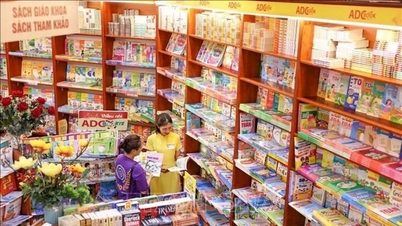

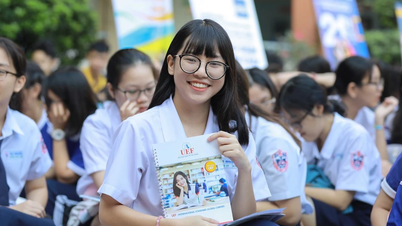


















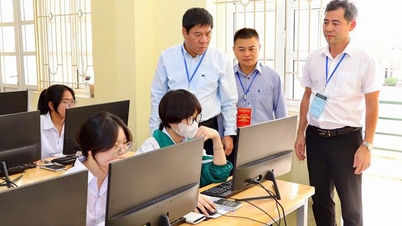










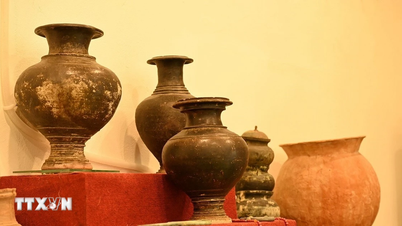




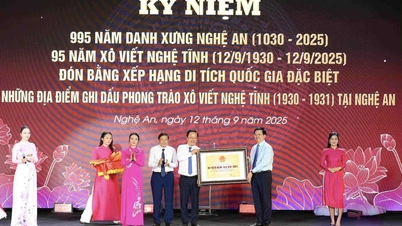














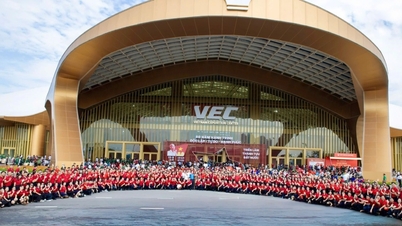










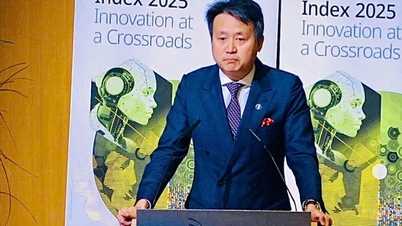




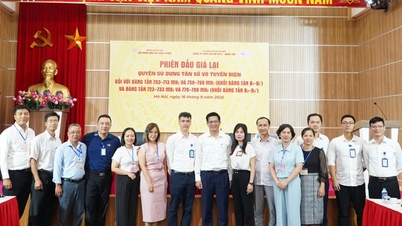









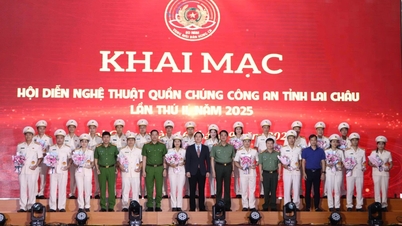



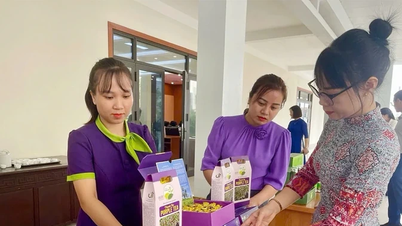












Comment (0)